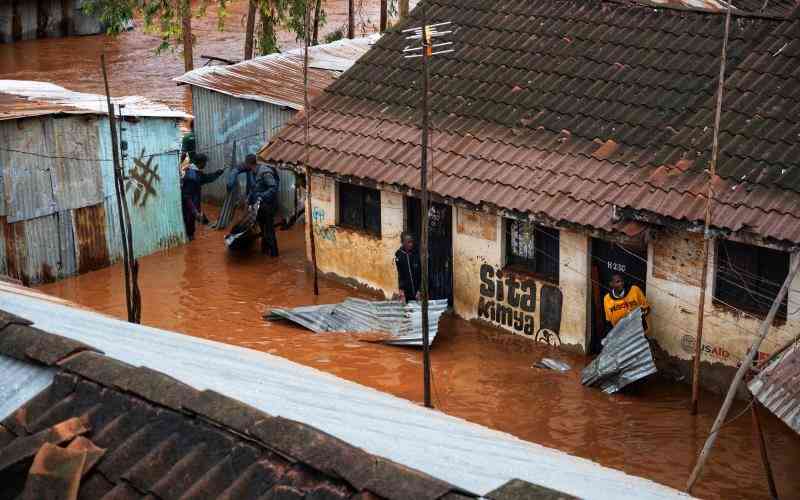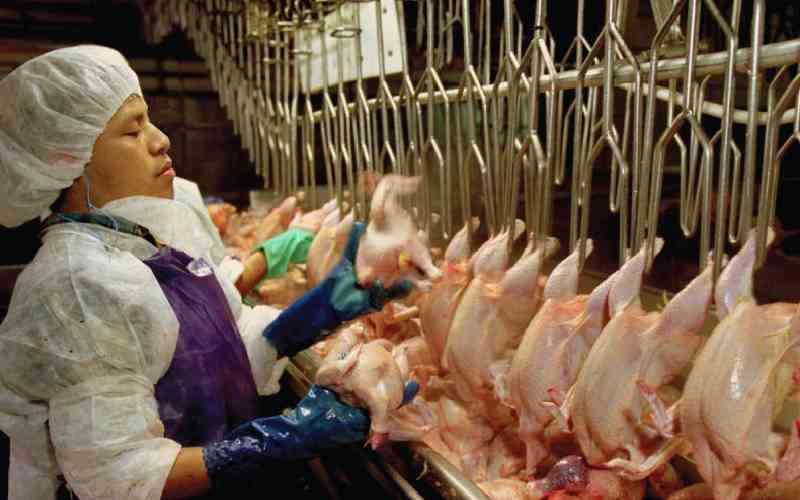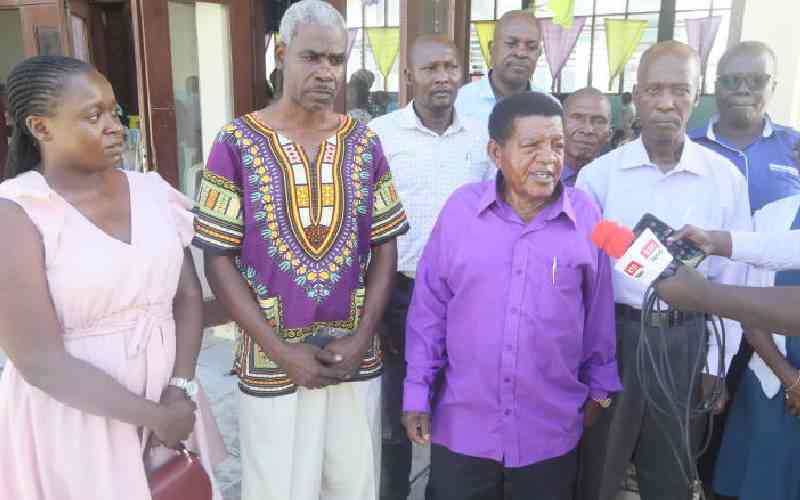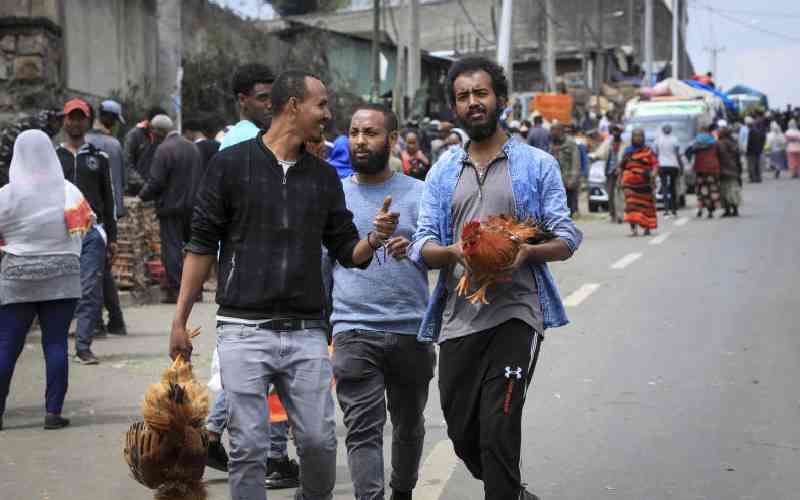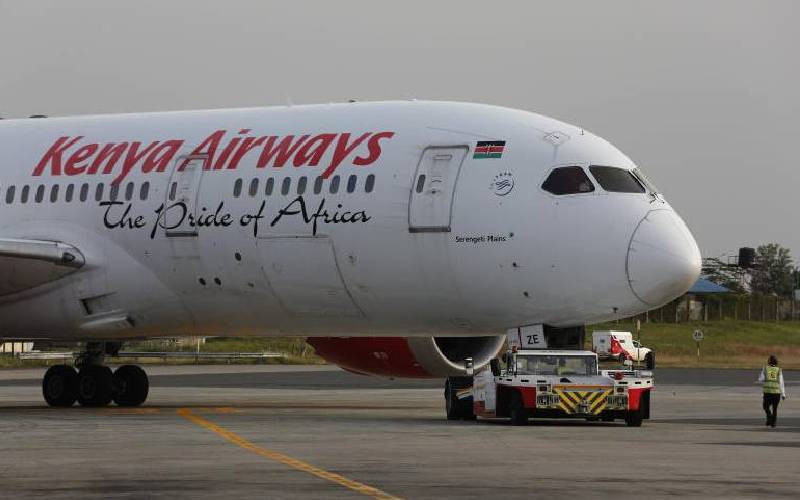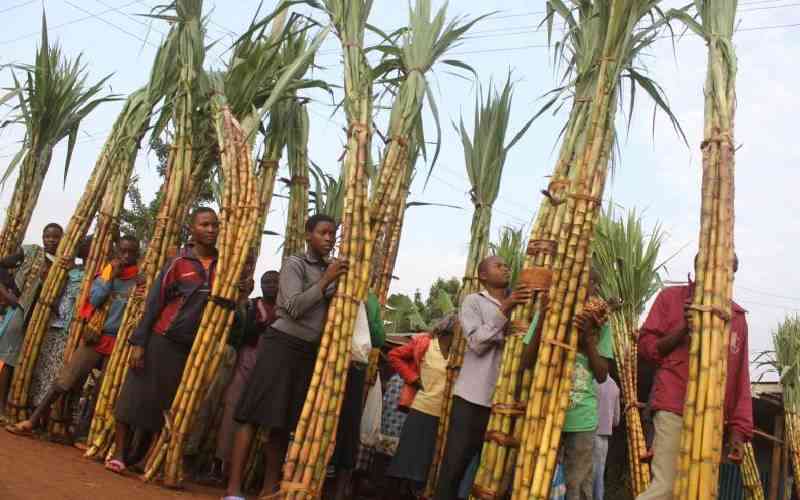By Standard Team
The fireball from burst fuel pipeline in Nairobi’s Sinai slum could just have been a ghastly reminder of disasters Kenyans court daily and painful warning many are sitting on a time-bomb.
That is the painful verdict from countrywide survey by The Standard after the Sinai Disaster. This is despite the shocking statistics from the Kenya National Disaster Operational Centre that show that since the year began, there have been 110 fire incidents – up from 70 from October to December last year – which have destroyed close 5,376 houses. They were mostly reported in urban slums.
 |
There are also homes and businesses underneath high-voltage power lines, some of which are lit by electricity from illegal connections. |
Now, consider the fact that whether in Mombasa, Nakuru, Eldoret Kisumu and the smaller towns dotting the stretch where the pipeline passes, the duct is almost always sandwiched by homes and businesses. Yet the pipeline pumps about 10,000 litres of fuel per minute, which makes the prospect of leakage chilling, especially when the country’s inefficient and unreliable disaster management is considered.But it is not just on the edges of the pipeline that we court disaster every day.
There are also homes and businesses underneath high-voltage power lines, some of which are lit by electricity from illegal connections. Some of the buildings include skyscrapers that mushroom overnight, defying the principles of safety and guarantees of inspection to ensure appropriateness of construction and materials used.
There are also the homes and businesses that sandwich the railway line.
Worse, when trains are not on sight, the lines serve as open-air markets for tomatoes, fried fish, mitumba clothes, tobacco, and toys among other goods Kenya’s enterprising business groups sell.
There are also the groups that still siphon fuel spilt by tankers that have careened off the roads, or even from the trucks squeezed into the unofficial parking bays on designated points along the highways, such as at Sultan Hamud, Salgaa, Busia, and Malaba.
The tragic reality is among those ‘milking’ the tanks are people whose thirst for cigarettes seemingly is either irresistible, or unquenchable.
Matters are complicated by the fact two years after one of the worst oil tanker tragedies, which claimed over 100 lives, special off-road parking bays for truckers have not been built as the President directed. The sad reality is, the dalliance with death continues.
Horrific accidents
There are also the killer public transport vehicles, which thanks to corruption among police officers and Transport ministry officials, operate without speed governors and inspection for roadworthiness.
On the wheels are drivers who, were Government records reliable, should either be in jail or blacklisted. But what happens? After horrific accidents like the two sobering ones last month in Eastern Province, Government officials talk tough, police carry out crackdowns for a week, and then with time, we are back to our usual road chaos … until the next roads deaths wake us up from our stupor.
On Tuesday, Kenya Pipeline Corporation Managing Director Celest Kilinda acknowledged the danger of human settlements and other activities around its fuel storage and distribution networks.
“We have paid out Sh29 million in Nairobi to get them out of the pipeline area, but we are also carrying out civic education to inform them about the dangers of living near the pipelines,” revealed Kilinda.
Not even the Jomo Kenyatta International Airport, which is often the scene of troubled and aborted take-offs because of aircraft’s technical problems or collision with birds, has been spared the encroachment of human settlements – whose clearance politicians almost always resist for votes.
Conceding JKIA is in this state, Internal security minister Orwa Ojode gave notice all structures on the planes’ path would be flattened.
But going by KPC’s and Kenya Power and Lighting Company’s past failure to clear its own wayleafs particularly in the informal settlements where millions live in close proximity, this notice could also fail to achieve.
Encroachment on key pipeline installations is noticeable, from the point of delivery and refining in Mombasa, to the last point of the underground ducts.
From the Kipevu Oil Terminal within the precincts of Mombasa Harbour, unrefined oil from tankers that dock to discharge their cargo is piped to the nearby Kenya Petroleum Oil Refinery in Changamwe in Mombasa mainland.
“We have meager resources to support us and can ill-afford houses in other areas away from here,’’ explained Mwangangi Sio, a resident of Mwangaza village next to the Kipevu Terminal.
Residents of Usoma village in Kisumu are among those who continue to sit on the time bomb – they live a few metres from the Kisumu Pipeline Depot.
Reports from Nakuru indicate that two years after the Sachangwan tragedy, it is still business as usual, as unscrupulous individuals collude with drivers and conductors to siphon oil at selected points between Naivasha and Eldoret.
Resist relocation
Every morning youth converge at the trading centres along highway, to engage in the illegal but lucrative trade. The illegal and risky trade is most noticeable at Mai Mahiu, Kikopey, Kibunja and Sachangwan trading centres.
The flight paths choked by human encroachment include those of airports and airstrips in Eldoret, Kitale, and Kakamega. “This is a disaster in waiting. The Government cannot take anymore of such laxity and resistance to relocation,” Ojode said of the problem at JKIA flight path.
“We must move with speed and save Kenyans from avoidable death traps,” he added then issued a 14-day quit notice to the dwellers to relocate or face evictions.
He told The Standard Nairobi PC Njoroge Ndirangu had been instructed to move with speed and begin evictions after the two-week notice.
The Government also fear terrorists could use these structures on flight passages to compromise air safety.
The other locations where lives could also be at risk include areas prone to landslides, and rudimentary mining in Nyanza and Coast provinces.
 The Standard Group Plc is a multi-media organization with investments in media
platforms spanning newspaper print operations, television, radio broadcasting,
digital and online services. The Standard Group is recognized as a leading
multi-media house in Kenya with a key influence in matters of national and
international interest.
The Standard Group Plc is a multi-media organization with investments in media
platforms spanning newspaper print operations, television, radio broadcasting,
digital and online services. The Standard Group is recognized as a leading
multi-media house in Kenya with a key influence in matters of national and
international interest.
 The Standard Group Plc is a multi-media organization with investments in media
platforms spanning newspaper print operations, television, radio broadcasting,
digital and online services. The Standard Group is recognized as a leading
multi-media house in Kenya with a key influence in matters of national and
international interest.
The Standard Group Plc is a multi-media organization with investments in media
platforms spanning newspaper print operations, television, radio broadcasting,
digital and online services. The Standard Group is recognized as a leading
multi-media house in Kenya with a key influence in matters of national and
international interest.




